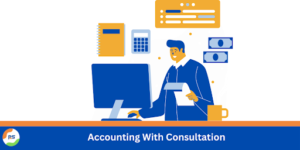Switching accounting platforms might seem risky, but understanding how to migrate to a new accounting software without losing data makes the process safe and manageable. For businesses in Dubai, Recordac Accounting and Consulting Services ensures smooth transitions, offering expert support and protection for your financial records.
Are you ready to switch to more efficient and innovative accounting software? Now, let’s see how to proceed without jeopardizing your valuable data.
Why Businesses Switch Accounting Software
Businesses have many reasons why it is a good time to change. Whether it’s improved functionality, an enhanced user experience, cloud alliances, or affordability, the ideal software can boost productivity and compliance. Nevertheless, many companies are afraid of losing information.
That’s why knowing how to migrate to a new accounting software without losing data is vital.
Step-by-Step Guide to a Safe Accounting Software Migration
Data migration does not need to be complex. The secret lies in planning and executing every step.
- Understand Your Existing System
Before engaging in any establishment, it is good to analyze your existing software. What is it storing: customer records, vendor payments, tax filing, financial reporting, bank reconciliations?
List down:
- All financial data sets
- Active and inactive accounts
- Required historical records
This preparation is essential for a seamless migration to a new accounting software without losing data.
- Choose the Right New Accounting Software
Software solutions are not created alike. Take into consideration the feature that fits your business:
Not all software solutions are equal. Consider features that suit your business:
- Cloud storage and backup
- Multi-user access
- Compliance with UAE VAT laws
- Compatibility with your current data format
Before taking this step, it is essential to verify whether the new platform supports automated data migration or if manual import is required.
- Back Up All Existing Data
This is a step that cannot be overstressed. Make a complete backup of the system that you have always had. Store this backup in two separate places, one locally and one in the cloud.
Backing up ensures that you can restore everything in case of any migration error, a crucial part of migrating to a new accounting software safely without losing data.
- Clean and Prepare Your Data
Rock-solid clean data eases the migration process. Withdraw duplicate records, seal inactive accounts, and update mistakes in customer/vendor records. Ensure the use of account codes is standardized.
By spending time preparing your data, you will both save time and eliminate post-migration complications.
- Test the New Software
Conduct a small data sample before using your entire dataset when testing the new software. This aids you:
- Verify import settings
- Check compatibility
- Identify formatting issues
Testing a portion of your data is one of the safest ways to ensure that migrating to a new accounting software without losing data goes as planned.
- Begin the Migration Process
It is moving time now. About your software, this could involve:
- CSV file uploads
- API integrations
- Third-party migration tools
Read the migration guide by the provider. Do not leave out any patterns of field mapping and settings.
- Validate Transferred Data
Once the transfer is complete, perform a detailed audit. Check:
- Bank balances
- Invoices and payments
- General ledger entries
- Tax records
Compare these with your initial backup to ensure that everything is the same. This is a critical step in effectively migrating to a new accounting software without losing data.
- Train Your Staff
Despite the most desirable software, employee training is essential. Ensure that employees are familiar with the new platform and know how to input data as well as produce reports.
Numerous account mistakes occur after migration due to the user’s lack of knowledge about the new system.
- Common Mistakes to Avoid
Ensure that you do not commit the following pitfalls to ensure that your migration comes out stress-free:
- Skipping backups
- Migrating unnecessary or outdated data
- Ignoring compatibility issues
- Rushing the process
- Failing to test with sample data
Avoiding these errors ensures you understand how to migrate to a new accounting software without losing data while saving time and money.
Get Expert Help When You Need It
If your business lacks in-house expertise, consider hiring professionals to fill the gap. Recordac Accounting and Consulting Services in Dubai specializes in migrating to new accounting software safely and efficiently, ensuring data loss is minimized. Their group handles backups, data transfer, validation, and post-migration support.
Final Thoughts
Data need not be lost when the systems change. When you have a solid plan, a complete backup, a thorough review of data, and adequate testing, you can be assured that everything will go smoothly. Remember, how to migrate to a new accounting software without losing data comes down to preparation and brilliant execution.
Whether you upgrade to the cloud or transfer your legacy data, your accounting information can remain intact and precise.
Basing a new start with superior financial tools? You can count on experts at Recordac to ensure your migration process is stress-free and free of hitches. Have your data travel with authority.












